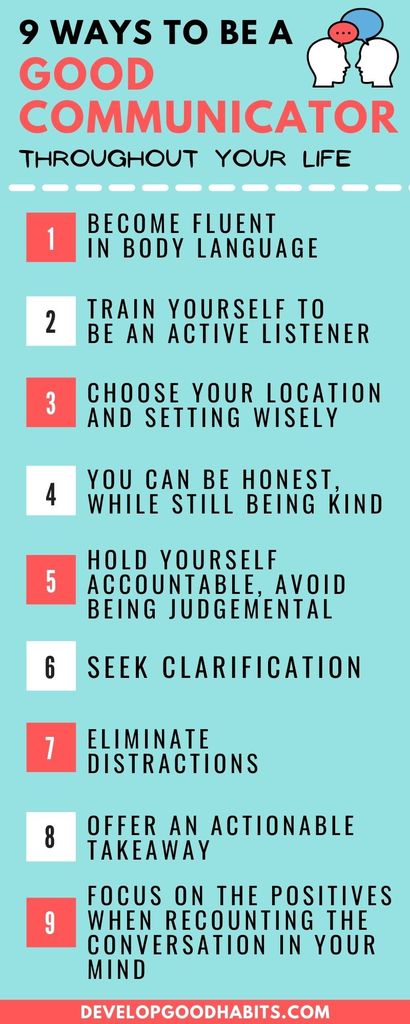I’ve said it before and I will say it again… communication plays a vital part in the success of our relationships, both personal and professional.
Open and direct communication is key in getting us to where we want to be and what we want out of life. And while the end result may not always be a positive experience, at least you will be able to look yourself in the mirror and know you did all that you could to communicate effectively.
In this article, I will provide 9 actionable strategies to help you figure out how to be a good communicator.
Communication Tip #1: Become Fluent in Body Language
Have you ever noticed the way a person tends to walk when summoned into the boss’s office? Or the way your child avoids eye contact and slouches when questioned about a bad grade?
How about the way someone tenses up and starts to fidget with their hands and feet when their significant other asks to have “a talk”.
Body language speaks volumes when it comes to our understanding, and eventual mastery, of the art of communication.
When trying to figure out how to be a good communicator, you should first start with training yourself to be a keen observer.
Similar to one’s tell in a game of poker, most people have a tendency to reveal their true motives or feelings whenever they are confronted with something uncomfortable or threatening… despite what side of the conversation they are on.
For instance, if you are about to downsize an employee due to budget cuts, you may avoid eye contact. Or start playing with your pen at your desk.
Conversely, if you are the employee about to be laid off, you may start smiling nervously. Or blinking a bit faster than usual. Maybe sit on your hands.
Regardless of the role you play in this scenario, if you choose to first observe the other person’s behavior, you will be better equipped to steer the conversation in a more positive and constructive direction.
This should help ease the blow a bit and hopefully leave both parties feeling a bit better about things to come.
Now, if you have nervous tics, you are showing a lack of confidence in what you're saying. Watch the video below to learn about nervous tics (like nail biting and fidgeting) and simple ways to fix them.
Communication Tip #2: Train Yourself to Be An Active Listener
When most people think about how to be a good communicator, there is a tendency to focus on the talking points.
This is natural… and important.
But it also poses a risk for misdirection. If we spend too much time searching for the perfect words, we are likely to lose sight of just how important a role listening plays.
In fact, I’d say they go hand in hand.
A large part of being a good communicator is being an equally good listener. And that doesn’t mean just hearing the other person’s words… but evaluating, dissecting and verbally acknowledging them.
One way you can do this is by conditioning yourself to be an active listener.
This method keeps you engaged in the conversation by listening attentively to what the other person is saying, paraphrasing and reflecting back what is said, and withholding judgment and advice.
Active listening lets the other person know that you are truly hearing what it is they have to say and validating it.
Communication Tip #3: Choose Your Location and Setting Wisely
If you want to be an effective and good communicator, it’s important not to neglect the proverbial arena in which you choose to do battle.
In other words, choose your location wisely.
Whether you realize it or not, where and when you choose to communicate will set the tone for the entire conversation, presentation, deliberation… etc.
If you are looking to communicate on a personal level with a family member, significant other or friend… you may want to choose a more intimate location. Someplace that is indifferent and non threatening. A place you both feel comfortable.
You may also want to have the talk at a point in the day when you both feel refreshed and focused, and there is little chance for distraction.
If you are an employer wanting to increase productivity among the staff, you’ll want to create a comfortable and productive space.
Perhaps this means bringing some flowers, coffee, tea and breakfast treats into the conference room first thing in the morning. Ensuring everyone is caffeinated and fed is a good way to kickstart the day and get everyone moving in the same direction.
If you are a public speaker, you may want to think about choosing a location that appears a bit too small. This will give the illusion of a packed room, which will send a message to your audience that they should consider themselves lucky to be present for whatever it is you have to say.
You can also consider playing with the temperature controls to make it a few degrees warmer… this will help your audience feel like they’re getting “worked up”!
Keeping your audience and your message top of mind will help you select the best location to get your point across most effectively.
Communication Tip #4: You Can Be Honest, While Still Being Kind
The last thing anybody enjoys is being criticized.
And the sad part is, we have all been found guilty of doing it to another person… whether intentional or not.
Ineffective communication skills often result in one or both parties feeling attacked, belittled or criticized… but the good news is, you can change this.
When I think about how to be a good communicator, I typically think about being honest and direct. The problem is, more times than not, honesty comes across as mean.
Think about it.
Say you own a public relations firm and were to tell one of your executives that they aren’t getting your clients enough press. They would most definitely take that personally and believe they weren’t good at their job. That their job was on the line.

Or if you told your wife you didn’t like a dish she made for dinner, she may believe she is a terrible cook and never try anything new again.
In both scenarios, you are being honest with the other person… yet they are left feeling bad, even if that wasn’t your intention. It is simply human nature to self loathe in criticism.
But here’s the good news! You can fix this with a “kindness kicker”… which is basically an unexpected compliment or constructive follow-up remark.
For instance, you can tell your employee that they aren’t getting enough press placement… but they are really great at the event planning. From there, you can come up with a plan together to switch their focus to a place where they will be the most productive for you.
Similarly, if you were to tell your wife that you aren’t a big fan of tonight’s dinner… but have had a real craving for her chicken parmesan lately, she’ll take away that this was simply a miss. And won’t beat herself up too badly.
It’s not that hard to be honest and kind simultaneously. Once you figure out how to do so, you’ll find that communicating is much less stressful.
Communication Tip #5: Hold Yourself Accountable, Avoid Being Judgemental
You’ve likely heard the expression, “take one for the team”.
Sometimes, in order to be a good communicator, you need to be accountable and willing to take some of the blame.
This not only keeps the conversation from becoming one-sided, but also cuts back on the threat of making the other person feel inadequate or guilty in some way.
When someone feels bad about themself, they have a tendency to shut down… at which point anything you have to say to them will likely fall on deaf ears.
Replacing the word “You” with “I” is a simple way to make yourself accountable.
Here’s an example of a conversation between a parent and child.
Scenario 1: You never clean your room without being asked. I am running around doing everything for you and shouldn’t have to ask for help!
Scenario 2: I have been so busy with work, after school activities and household stuff that I get frustrated a little too easily these days. I’m sorry about that. What if I set up a calendar reminder for you to straighten up your room each week as part of your chores? It would really help me out!
By simply inserting “I” into the conversation and limiting the use of “You”, the child now feels as if they are part of a team and will likely be more willing to help out… not because they are being forced to, but because they want to do their part.
It’s also a great way to avoid an unnecessary argument and vague threats.
Communication Tip #6: Seek Clarification
When trying to hone in on how to be a good communicator, you need to tell yourself that it’s ok to ask questions.
If you don’t understand a point that someone is making, or a question they have asked, then you need to seek clarification. By not doing so, you may just find yourself being confused or lost as to what the next steps should be.
When engaged in conversation with a loved one or friend, for instance, it would be unclear if the other person simply told you they were unhappy. If you don’t see clarification and ask for specific reasons, you’ll never be able to get to the bottom of things and fix the problem. If it can, in fact, be fixed.
In a professional setting, it would be pointless for your boss to tell you that you’re not doing a good enough job… without citing exactly where you may be falling short. In this case, you may need to ask for a list and let him or her know that you want to improve.

If you are a professional speaker brought in to motivate an audience to reach for their goals in life, you’d be hard pressed to find success unless you provided them with actionable steps they need to follow.
Clarification is such an important factor in communication… and also very necessary if you want to be any good at it.
As Carl Sagan once said, “There are naive questions, tedious questions, ill-phrased questions, questions put after inadequate self-criticism. But every question is a cry to understand the world. There is no such thing as a dumb question.”
Communication Tip #7: Eliminate Distractions
When trying to communicate effectively, it’s important to keep distractions at a minimum.
It can be hard enough to listen to someone intently, even when you’re in a quiet place… especially if you don’t particularly want to be having the conversation that you are.
When attempting to communicate through a difficult situation or topic, the last thing you want is to let anyone’s mind wander. You need the focus to be on that conversation, in that moment.
Don’t try talking to your child about his lack of good judgement in choosing certain friends while at a crowded park or hockey game, for instance. It’s one thing to try and keep the conversation light, but you can do that in a much less distracting way… like over takeout dinner from his favorite restaurant.
If you are trying to discuss a possible career change with your husband while binge watching a netflix series… his focus likely won’t be in the best place.
Knowing your audience and what it is you want to say should coincide with where you want to say it. The more important the topic, the quieter the space should be.
Communication Tip #8: Offer an Actionable Takeaway
We discussed the importance of asking questions and seeking clarification when it comes to how to be a good communicator.
And the perfect accompaniment to that strategy would be to offer or seek actionable takeaways.
What does this mean?
Well, it means that you need to have “next steps” in mind… a plan or course of action that you can follow in order to build upon the conversation.
If your employer tells you that you need to work on your presentation skills, you’d first seek clarification as to what you’re doing wrong specifically… and then you’d follow up as to which steps you could take to improve.
Maybe it’s training yourself on a different creation platform.
Or seeking tips on how to improve the quality of your voice when you address a crowd, whether you speak too fast or too slow… not loud or clear enough.
Perhaps you fidget too much and search the internet for tips on how to eliminate this.
On a personal level, maybe your spouse is unhappy with the late hours you work.
If so, you can ask for clarification as to what she’d like more help with, or what she feels is missing… and then come up with things you can do to try and make things better.
Something as simple as setting aside one day every week for a date night. Or letting her sleep in on Sundays so that you can make breakfast and do a few loads of laundry. Maybe schedule her a massage and take over driving your daughter to soccer practice one night.
Regardless of the situation, having an actionable takeaway will go a long way towards getting both parties on the same page.
It also says that you care enough to make the effort.
Communication Tip #9: Focus on the Positives When Recounting the Conversation in Your Mind
I saved this tip for last because it is crucial to bringing all of your communication efforts together.
Most of the time, we are our own worst enemy when left to our thoughts.
What did I do wrong?
What didn’t go right?
I failed.
I’m lost.
But if you followed even a handful of these communication techniques, you can tell yourself that you did something right.
Even if the overall tone of the conversation was negative, I can assure you that there is something positive buried in there that you can take away from the experience.
Sure, maybe your boss told you to do better… but the positive is that he is giving you the opportunity to do so.
Maybe your husband feels as if he needs to spend more time with his friends… but the positive is that he is sharing his feelings instead of quietly resenting you for all of the time he puts in at home and work.
There is always a silver lining… always something to build on if you look closely enough.
Focusing on the negatives will only result in a downward spiral of self loathing and doubt, which will likely inhibit your efforts to be a better communicator in the future.
Final Thoughts on How to Be a Good Communicator
Communication is a part of life.
Whether it is through our words, body language, sign language, emails, letters… we are always communicating.
So teaching yourself how to be a good communicator only makes sense.
It makes sense if you want to be the best possible version of yourself.
It makes sense if you want to forge meaningful and lasting relationships.
It makes sense if you want to be respected and never ignored.
Following these steps will not only improve your communication skills, but your life in general will improve.
It’s a good rule of thumb to say what you mean… and mean what you say. How you say it is the tricky part.
But once you’ve mastered these tips, you should have no problem being the type of communicator you’ve always wanted to be.
And if you're looking for more tips and ideas, be sure to read these articles:
- 13 SMART Goals Examples for Improving Your Communication Skills
- 11 SMART Goals Examples for Improving Your Listening Skills
- 8 Simple Ways to Be a Good Listener in Conversations

Nicole Krause has been writing both personally and professionally for over 20 years. She holds a dual B.A. in English and Film Studies. Her work has appeared in some of the country’s top publications, major news outlets, online publications, and blogs. As a happily married (and extremely busy) mother of four… her articles primarily focus on parenting, marriage, family, finance, organization, and product reviews.



